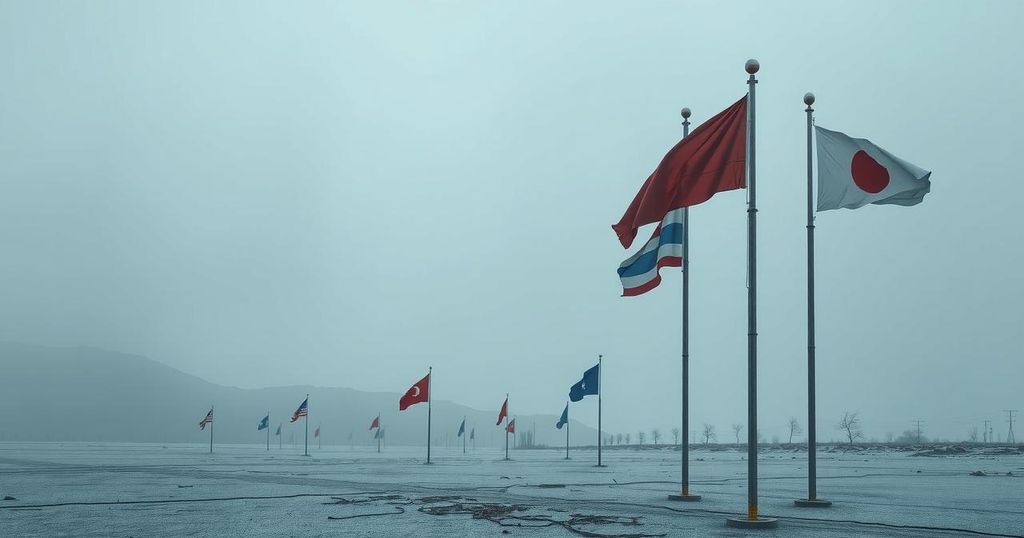Putin’s World Shrinks: Ukraine’s War Deepens Russia’s Isolation

- The war in Ukraine is eroding Russia’s alliances.
- Syria’s involvement shows Moscow’s waning influence.
- Armenia’s exit from CSTO signals a major defection.
- Finland and Sweden’s NATO entry alters the security landscape.
- Central Asian nations are tilting towards the West instead of Russia.
Diplomatic Isolation Looms Over Russia Amid Ongoing Conflict
In the bleak reality of the ongoing war in Ukraine, which has now dragged into its third year, Russia is facing a significant strategic downturn. The conflict is not just decimating Russian troops; it’s also systematically eroding the trust and goodwill that once bound Russia to several of its allies. Vladimir Putin finds himself at a crossroads, where the losses on the battlefield reflect a broader diplomatic failure, echoing the United States’ turbulent exit from Afghanistan but perhaps yielding even greater isolation. The sounds of camaraderie and political alignment that once defined Russian foreign policy are fading into a heavy silence.
The Shattered Alliance in Syria
Take the situation in Syria, for example. This country had served as a proud testament to Russia’s military prowess just a few years back. Moscow’s intervention in the Syrian civil war in 2015 was pivotal for Bashar al-Assad, effectively reversing the tide in his favor. Russia’s strategic alliance with Assad secured military bases and influence in the region. However, by 2024, Russia’s focus on Ukraine caused its commitment to Syria to wane. As rebel forces gained strength, and Assad found himself cornered, Russian support faltered, exposing a vulnerable ally to unchecked aggression.
Armenia and New NATO Memberships Add Pressure
Similarly, Armenia’s relationship with Russia has soured dramatically. Traditionally, Armenia viewed Moscow as a defensive ally against Azerbaijan and Turkey. Yet as Nagorno-Karabakh fell in 2023, Russia’s inability to provide the expected support left Armenia feeling betrayed. Anger boiled over in Yerevan, and soon enough, the critical military agreements that once cemented their ties were halted. The final straw came when Armenia withdrew from the CSTO, the security alliance it had been a part of since 1997, leaving a once-strong bond in tatters. Countries like Finland and Sweden, which maintained a careful distance from NATO, saw the war as a wake-up call, leading them to join the alliance in quick succession, further tightening NATO’s grip around Russian borders.
Central Asia’s Shift and Iran’s Dwindling Support
Central Asia tells a similar story where once Russia had significant influence. Nations like Kazakhstan and Uzbekistan are inviting ties with Europe, China, and Turkey, drawing attention away from Moscow’s grasp. Beijing’s Belt and Road Initiative, coupled with Turkey’s increasing military presence, indicates a seismic shift in regional allegiances. While Moscow is preoccupied with the war, it risks losing its sphere of influence in these key territories to a blossoming partnership with the West. Even Iran, an ally that provided drones for Russia’s offensive, has begun to feel the sting of abandonment. When Israel struck Iranian positions with American support, Russia offered little more than token diplomatic support, highlighting the lopsided nature of their once-strong alliance.
Russia’s Isolation Signals Significant Political Shifts
In summary, the landscape surrounding Russia has fundamentally changed, and for the worse. From Syria’s collapse to Armenia’s defection and the NATO expansion that Putin aimed to thwart, the implications are huge and historic. Where Moscow once wielded influence, it now finds itself isolated, with long-standing allies distancing themselves at an alarming rate. The war in Ukraine has revealed cracks in what once seemed unshakeable relationships, marking a significant turning point in global geopolitics. As friendships erode and alliances fray, Russia’s isolation appears not just inconvenient, but possibly existential in nature. Putin’s world, once expansive, is now constricting rapidly, as valuable geopolitical connections slip away like grains of sand through fingers.
Russia’s diplomatic landscape is shrinking as its military focus on Ukraine causes allies to drift away, much like the pattern seen in Afghanistan. Countries such as Syria and Armenia illustrate the deterioration of ties, while the expansion of NATO indicates a regional shift away from Russian influence. Meanwhile, alliances, like that with Iran, are also fraying, suggesting a broader trend of isolation for the Kremlin in the face of global realignment.







